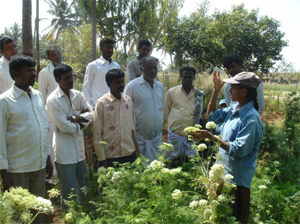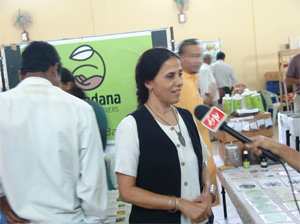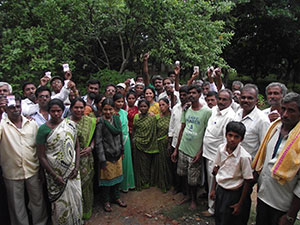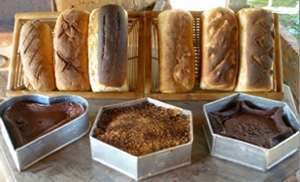
Research at Annadana is integral to our overall approach to work. Applied research and experimentation on various organic techniques of cultivation is conducted continuously at the farm. The aim is to develop systems of cultivation that are organic, high yielding, low-cost, sustainable and based on farm-inputs; such that not only is it economical but also replicable by small-scale and marginal farmers.
The key areas of Annadana's research include : Seed Conservation Over the years, Annadana has recognised the loss of farmers' traditional knowledge of seed conservation as one of the serious agricultural crises of our country. Each year, rigorous observation, germination tests and careful documentation of 80 different varieties of vegetables ensures a richer understanding of every step involved in seed conservation:
- Identification of healthy plants and fruits
- Selection of fruits isolated for maintaining varietal purity
- Harvesting at the appropriate time for each of the varieties
- Extraction - Wet & Dry methods
- Shade-drying - an art and science that determines the viability of the seed.
- Storage - Stringent quality measures taken for determining the moisture relative humidity content of the particular variety.
Annadana regularly shares this knowledge with visiting farmers and other groups from various parts of the country. In addition, we have scientists, horticulturists from State and National Institutes and Gene Banks who approach Annadana for support in these areas. Seed Bank Annadana's Seed Bank is one of the best managed low-cost seed banks in the country. We have extensively researched existing seed banks and available technology to improve the techniques, equipment and methods that we use in order to share this knowledge with a larger audience. The driving force for our research in this area has been to create similar low-cost, user-friendly seed banks in unused farm-sheds, other such existing spaces at the village or Panchayat level. Emphasis on low-cost design, use of locally available and innovative materials, technical know-how and application of these aspects to suit tropical and temperate climates are areas of Annadana's expertise. We have extended support in setting up of Seed Bank in 2007 at Bio- Centre, a Horticulture State farm at Hulimavu in Bangalore. Over 45 organic vegetable varieties were grown for the production and conservation of seeds. This project has been the pride of the department and well appreciated by the Government.
Low-Cost Farm
Applications
Research on various systems and safe, low-cost organic farm applications and techniques is central to Annadana's work. The use of locally available materials, setting up of demonstrable models at the farm, sharing information on cost of installation and maintenance ensures that Annadana's research findings are shared with marginal and small-scale farmers to adapt to their requirements. Presently, the applications researched and used include the raised bed system, dynamising water, using flow forms, composting farm residues and local available. Resources, soil rejuvenation through green manure, hedges and on-farm cultivation of bio mass and bio pesticide plants, vermi- composting, efficient micro-organisms, organic growth promoter and immunity boosters, development of bio-pesticides using fermentation, decoction and extraction of local plants. Some of the results of this area of research are shared here.
Plant Yield Data
for Organic Farming
For a larger population to subscribe to organic farming methods, Annadana recognises that they need to be convinced of the viability of these methods. This is only possible through reliable, extensive and time-tested data on plant yield using such methods.Drawing from our intensive ongoing research and documentation on yield of varieties, resistance and tolerance to diseases, heat and water stress, percentage of germination, we maintain detailed data on plant yield per sq ft for food as well as seed production. For instance, our research has shown that
- 1 acre can host 6000 plants of small fruited tomatoes (cherry, etc.), which can produce 480 kg of seeds (300 seeds per gram)
- Similarly, 1 acre can host 6000 to 8000 capsicum plants. Where 1 plant yields an average of 1.3 to 1.8 kg and the average yield per acre is about 8-10 tons. Our research data forms the basis of our work; and helps reinforce for various visitors that organic farming is viable for all farmers.
- Download Plant yield data
Annadana believes that knowledge, planning, implementation and discipline is crucial for seed production and seed saving to sustain livelihoods of farmers across the country. In the current climate, particularly, where farmers are losing their traditional knowledge and skills of seed conservation, there is a critical need for them to be re-skilled to become farmer researchers, seed savers and breeders. To facilitate this and reach out to a wider audience, Annadana participates in various fora such as :  Peer-organised conventions and seed exchange melas. Annadana is a member of the of the National Steering Committee Organic Farming Association of India(OFAI) and regularly participates at its annual conventions and other programmes. Regional level seed exchange melas across the country are also viewed as an interesting avenue to meet farmers, learn from them and share Annadana's experience on seed saving and organic farming methods. Annadana has reached out to approximately 1 million people through these various programmes and has distributed over 3,00,000 organic vegetable seed packets free to marginal farmers across India.
Peer-organised conventions and seed exchange melas. Annadana is a member of the of the National Steering Committee Organic Farming Association of India(OFAI) and regularly participates at its annual conventions and other programmes. Regional level seed exchange melas across the country are also viewed as an interesting avenue to meet farmers, learn from them and share Annadana's experience on seed saving and organic farming methods. Annadana has reached out to approximately 1 million people through these various programmes and has distributed over 3,00,000 organic vegetable seed packets free to marginal farmers across India.
Training Workshops/Interventions
 Training workshops/ interventions Over the last decade, Annadana has trained thousands of farmers, scientists, professionals from different walks, agronomists, horticulturists and technicians and home makers in organic farming methods. In addition facilitating these workshops at its own knowledge-farm, Annadana also trains farmers at farmers' fields, at the request of like-minded groups and peer organisations.Our beneficiaries include groups, associations, institutions and more.
Training workshops/ interventions Over the last decade, Annadana has trained thousands of farmers, scientists, professionals from different walks, agronomists, horticulturists and technicians and home makers in organic farming methods. In addition facilitating these workshops at its own knowledge-farm, Annadana also trains farmers at farmers' fields, at the request of like-minded groups and peer organisations.Our beneficiaries include groups, associations, institutions and more.
Political Advocacy
 Political advocacy Sustaining the livelihoods of farmers being the main driving force, Annadana engages with various stakeholders including the State to influence policy planning and decision-making. Some of these efforts include. The 'My Right to Safe Food' campaign initiated by Annadana in 2009 to raise awareness about Chemical free food and Food Safety. Establishing seed conservation banks for State Horticulture Department, with a view to making Annadana's knowledge and expertise on seed saving accessible to marginal and small-scale farmers. Representing farmers' interests at various platforms including Corporate houses, Defence establishments, Educational Institutions, Hospitals and State Governments.
Political advocacy Sustaining the livelihoods of farmers being the main driving force, Annadana engages with various stakeholders including the State to influence policy planning and decision-making. Some of these efforts include. The 'My Right to Safe Food' campaign initiated by Annadana in 2009 to raise awareness about Chemical free food and Food Safety. Establishing seed conservation banks for State Horticulture Department, with a view to making Annadana's knowledge and expertise on seed saving accessible to marginal and small-scale farmers. Representing farmers' interests at various platforms including Corporate houses, Defence establishments, Educational Institutions, Hospitals and State Governments.
Studies show that India is soon becoming an illness capital of the world.
 |
|
||||||
| (Source: International Diabetic Federation Findings & WHO) The reason we are falling sick so often and increasingly with debilitating diseases is that we've stopped questioning the food we eat We buy food labeled low fat, reduced sodium, no cholesterol thinking they are good for us - Why? Because, new age doctors, researchers, policy makers, scientists say so... Yet the instances of acute diseases are on the rise. Truly, what we eat determines our health. Annadana offers a range of awareness sessions on various aspects of our health, food and lifestyle to enable you to make more informed choices for a better life. We regularly facilitate such sessions for schools and colleges, corporates, institutions, and other interested groups.Choose from any of the topics below and get in touch so we can facilitate a session, customised for your group/office/school/ institutional requirements. Genetically Modified (GM) FoodsIn this session, find out all you need to know about GM Foods, dispel myths and clarify your understanding based on facts and verifiable information so you can choose safe foods for yourself and your family. Healthy AlternativesA healthy lifestyle is no longer a choice, but an imperative. Get in touch to share your requirements for such a session and find out how to make simple, easy changes in your lifestyle. Mothers for Safe FoodsClearly there is an increasing incidence of Childhood obesity and Juvenile diabetes in our country today. There is overwhelming evidence implicating refined sugar as a major cause of degenerative diseases. Studies show that 25% of the disposable income is spent on medical services. And yet, aerated drinks, heavily salted snacks that use hydrogenated fats, refined flour, processed foods and other such products are easily accessible to children. What's more they are made colourful and attractive using harmful preservatives and colouring agents. Understand the nature of different foods we consumer on an everyday basis. Find out how they affect our health. Learn what can be done to improve our children's diets so that they eat healthier, safer foods without compromising on quality and taste. As caregivers for our children, the question we need to ask is how can we afford NOT to eat healthy with the high costs of falling ill? |
|||||||
|
|||||||






